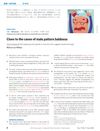News Updates
April 2012
in “
Lab Animal
”

TLDR Early exposure to germs may protect against autoimmune diseases, lack of sex increases alcohol preference in fruit flies, a potential baldness treatment could involve blocking a specific receptor, skin memory cells help prevent re-infection, high-fat diets can affect brain cells related to weight, and the link between social status, stress, and heart disease in primates is unclear.
The document provides updates on various scientific studies. One study by Kasper and Blumberg supports the 'hygiene hypothesis' by showing that germ-free mice are more susceptible to autoimmune diseases than normal mice, and that early exposure to microbes can protect against these diseases. Another study by Shohat-Ophir et al. found that male fruit flies deprived of sexual contact showed a preference for alcohol, linking sexual deprivation to increased reward-seeking behavior. Cotsarelis and colleagues discovered that prostaglandin D₂ (PGD₂) levels are higher in bald scalp tissue and that PGD₂ inhibits hair growth in mice, suggesting that blocking the related receptor GPR44 could be a potential treatment for male pattern baldness. Kupper's research indicated that resident memory T cells in the skin are effective in preventing re-infection, highlighting the skin's role in immunity. Blackshaw's team showed that a high-fat diet can lead to the proliferation of new brain cells in the hypothalamus, affecting weight regulation. Lastly, Petticrew and Davey Smith reviewed studies on primates and found inconsistent results regarding the link between social status, psychological stress, and coronary artery disease, suggesting that multiple factors may influence such outcomes.





